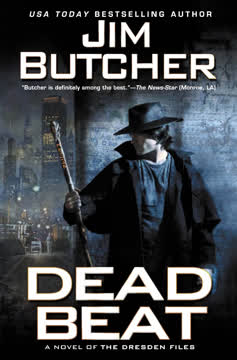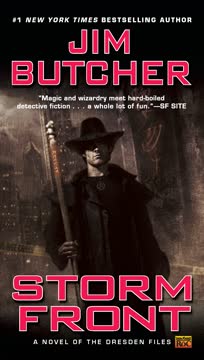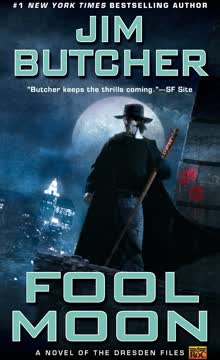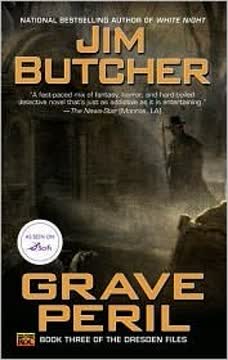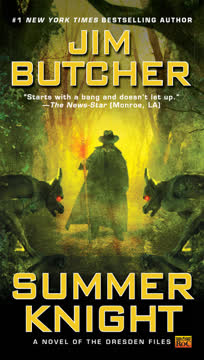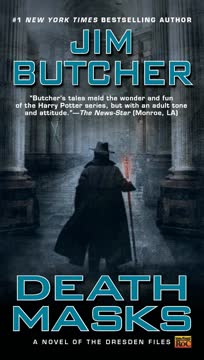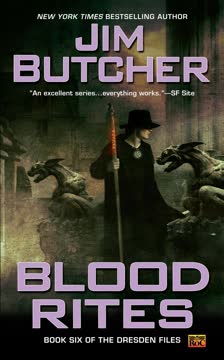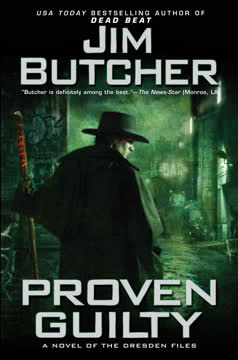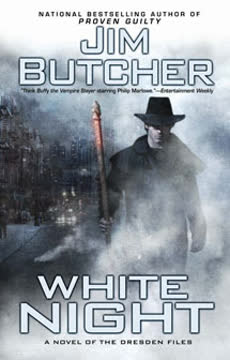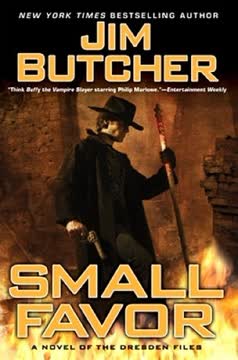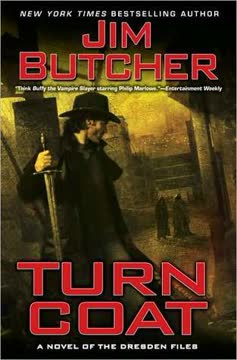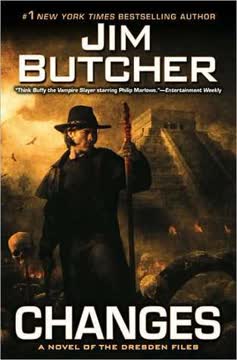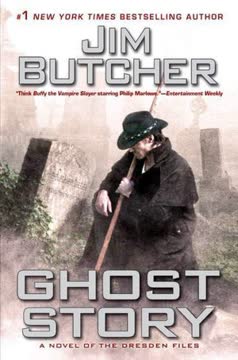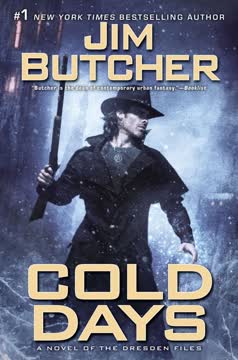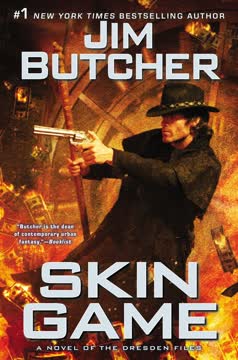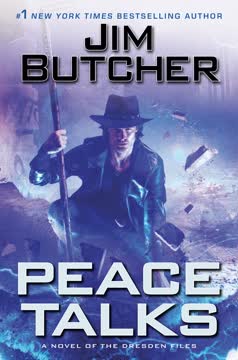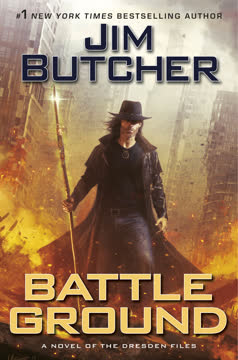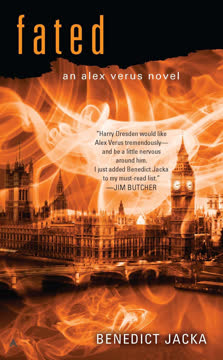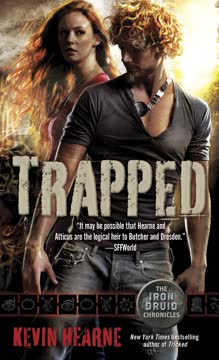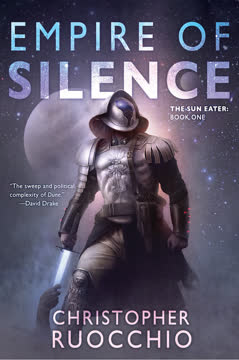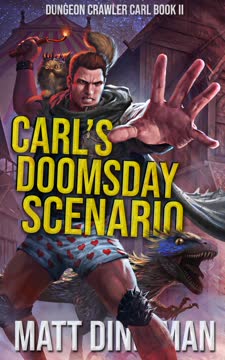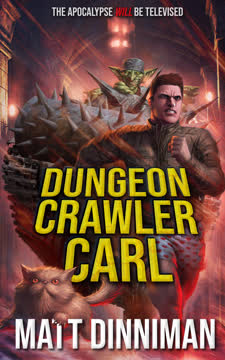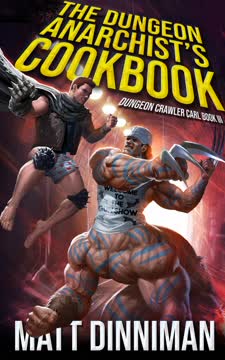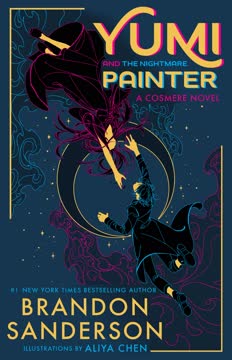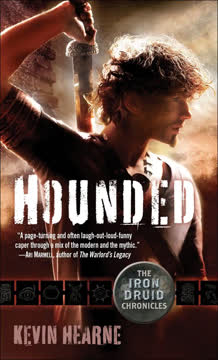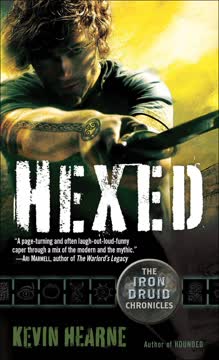Plot Summary
Harry's Chaotic Return
Harry Dresden, a wizard in Chicago, comes home to find his apartment in disarray, thanks to his half-brother Thomas's incubus nature. His life is further complicated by Karrin Murphy, a police officer and friend, who is leaving for a vacation with a dangerous man named Kincaid. Harry is left to water her plants and is troubled by her choice of company. As he contemplates his feelings for Murphy, he receives a mysterious package containing incriminating photos of Murphy, sent by the vampire Mavra, who blackmails Harry into finding a powerful book, The Word of Kemmler, or risk Murphy's ruin.
Allies and Enemies Emerge
Harry's investigation into the book leads him to a confrontation with a necromancer named Grevane, who is also after the book. Grevane's zombies attack Harry and his friend Butters, a medical examiner, forcing them to flee. They narrowly escape with the help of Harry's half-brother Thomas and his dog Mouse. Harry learns that multiple necromancers are in town, each seeking the book for its power. He realizes that the stakes are higher than he thought, as the book could grant its possessor immense power.
Secrets of Necromancy
Harry and Butters return to the morgue to investigate a corpse that might hold clues to the necromancers' plans. They discover that the dead man, a smuggler named Bony Tony, was carrying a jump drive with a mysterious number. This number could be the key to finding The Word of Kemmler. As they piece together the puzzle, they realize that the necromancers are planning something big and dangerous, and time is running out.
Bargains and Betrayals
Harry is approached by Marcone, a crime lord, who offers information in exchange for Harry's help against the necromancers. Marcone reveals that the necromancers are planning a ritual called the Darkhallow, which could grant them godlike power. Harry is torn between accepting Marcone's help and the risk of getting involved with the criminal underworld. Meanwhile, Harry's godmother, the Leanansidhe, is detained by Queen Mab, who offers Harry a deal to become her Winter Knight, which he refuses.
The Hunt for Power
Desperate for answers, Harry seeks out his godmother, only to find Queen Mab in her place. Mab reveals that the necromancers plan to summon the Erlking, a powerful faerie lord, to aid in their ritual. Harry learns that the Darkhallow will allow the necromancers to consume the spirits of the dead, granting them immense power. With this knowledge, Harry realizes the urgency of stopping the necromancers before they can complete their ritual on Halloween night.
Confronting Dark Forces
As Harry returns home, he is ambushed by Grevane's zombies. With the help of Thomas and Mouse, Harry fights them off, but the situation is dire. Grevane captures Butters, forcing Harry to confront the necromancer. Harry must use all his wits and resources to rescue Butters and stop Grevane, knowing that failure could mean the end for him and his friends. The clock is ticking, and the necromancers' plans are nearing fruition.
The Darkhallow Showdown
The necromancers begin the Darkhallow ritual, a spell that will grant godlike power to its caster by consuming the spirits of the dead. Harry, with the help of the Wardens, launches a desperate assault to disrupt the ritual. Amidst the chaos, Harry confronts Cowl, the most powerful of the necromancers. With the help of Bob the Skull, Harry manages to disrupt the spell, causing a catastrophic backlash that destroys Cowl and his plans, but not without significant collateral damage.
A New Role for Harry
In the aftermath of the battle, Harry is reluctantly drafted into the Wardens, the White Council's enforcers, as a regional commander. Despite his misgivings about the Council's methods, Harry accepts the role, recognizing the need for strong leadership in the face of growing threats. The experience has changed him, and he resolves to use his new position to protect those who cannot protect themselves, even if it means working with those he once distrusted.
Chicago's Fragile Recovery
As the city begins to recover from the chaos unleashed by the necromancers and the Wild Hunt, Harry reflects on the events that have transpired. He has made powerful enemies and difficult choices, but he remains committed to his path. With the Wardens weakened and the threat of the Red Court looming, Harry knows that the battle is far from over. Yet, he is determined to stand firm, drawing strength from his friends and allies as he prepares for the challenges ahead.
Characters
Harry Dresden
Harry is a wizard and private investigator in Chicago, known for his stubbornness and willingness to fight against overwhelming odds. Throughout the story, he grapples with the moral complexities of his choices, particularly his deal with Mavra and his use of dark magic. Despite his doubts, Harry remains committed to protecting his friends and the city, ultimately accepting a role as a Warden to better defend against future threats.
Thomas Raith
Thomas is Harry's half-brother and a vampire of the White Court. He struggles with his vampiric nature and the hunger that comes with it, but his loyalty to Harry never wavers. Thomas provides crucial support during the battle against the necromancers, and his actions highlight his internal conflict between his nature and his desire to protect those he cares about.
Karrin Murphy
Murphy is a lieutenant in the Chicago Police Department and a close friend of Harry's. Though she is absent for much of the story, her influence is felt through Harry's determination to protect her from Mavra's blackmail. Murphy's strength and independence serve as a source of inspiration for Harry, motivating him to make difficult choices for the greater good.
Butters
Butters is a medical examiner who becomes embroiled in the necromancers' plot. Initially fearful, he finds courage and resourcefulness, playing a crucial role in helping Harry disrupt the Darkhallow. Butters represents the everyman, caught in extraordinary circumstances and forced to confront his fears, ultimately proving himself a valuable ally.
Grevane
Grevane is one of Kemmler's disciples, seeking The Word of Kemmler to gain power. He is cold, calculating, and willing to kill to achieve his goals. Grevane's use of zombies and dark magic makes him a formidable adversary for Harry.
Corpsetaker
Corpsetaker is another of Kemmler's disciples, known for her ability to possess and control others. She is cunning and dangerous, using her powers to manipulate and deceive. Her interest in the Darkhallow ritual makes her a significant threat.
Cowl
Cowl is a cloaked figure with immense magical power, seeking to use the Darkhallow to ascend to godhood. His motives are shrouded in mystery, but his actions reveal a willingness to sacrifice anything and anyone to achieve his goals. Cowl's strength and knowledge make him a formidable opponent for Harry.
Kumori
Kumori is Cowl's partner, and unlike the other necromancers, she shows compassion by saving a life. Her actions suggest a more complex character, raising questions about her true motives and the nature of her magic. Despite her allegiance to Cowl, Kumori's compassion hints at a potential for redemption.
Queen Mab
Mab is the Queen of the Winter Court, a powerful and enigmatic figure. She offers Harry a deal to become her Winter Knight, which he refuses. Mab's involvement adds another layer of complexity to Harry's challenges.
John Marcone
Marcone is the most powerful criminal in Chicago, with a strict code of conduct. He offers Harry information in exchange for help against the necromancers, highlighting his pragmatic approach to power and survival. Marcone's involvement underscores the complex web of alliances and enmities in the supernatural world.
Plot Devices
The Word of Kemmler
The Word of Kemmler is a book containing the secrets of necromancy, sought by multiple factions for its potential to grant godlike power. Its significance drives the plot, as Harry races to prevent it from falling into the wrong hands.
Darkhallow Ritual
The Darkhallow is a ritual that allows a necromancer to consume the spirits of the dead, gaining immense power. The impending ritual creates urgency and tension, as Harry must stop it before Halloween night. The Darkhallow's potential for destruction underscores the stakes of the story and the lengths to which the necromancers will go to achieve their goals.
The Erlking
The Erlking is a powerful faerie associated with the Wild Hunt, capable of summoning spirits. His connection to the necromancers' plans adds a supernatural element to the story, as Harry seeks to understand and thwart their intentions. The Erlking's presence challenges Harry's abilities and forces him to confront the limits of his power.
Mab's Offer
Mab's offer to make Harry her Winter Knight represents a temptation of power and freedom from his debts. Harry's refusal highlights his moral integrity and the personal stakes involved in his choices. The offer underscores the theme of power and its potential for corruption, challenging Harry's resolve and principles.
Bob the Skull
Bob is a spirit of intellect housed in a skull, providing Harry with valuable information about magic and the supernatural. Bob's knowledge is crucial to understanding the necromancers' plans and the potential consequences of their actions. His temporary allegiance to Cowl highlights the dangers of power and the importance of loyalty.
Analysis
"Dead Beat" by Jim Butcher explores the complex interplay of power, morality, and personal responsibility. Harry Dresden's journey is marked by difficult choices and moral dilemmas, as he navigates a world filled with supernatural threats and political intrigue. The story examines the corrupting influence of power, as seen in the necromancers' pursuit of the Darkhallow, and the importance of maintaining one's integrity in the face of temptation, exemplified by Harry's refusal of Mab's offer. The novel also highlights the value of loyalty and friendship, as Harry relies on his allies to overcome seemingly insurmountable odds. Ultimately, "Dead Beat" is a tale of resilience and determination, as Harry embraces his role as a protector, ready to face the challenges that lie ahead.
Last updated:
FAQ
Synopsis & Basic Details
What is Dead Beat about?
- Wizard's Desperate Race: Harry Dresden, Chicago's only professional wizard, is blackmailed by the ancient Black Court vampire Mavra into finding a powerful necromantic text, The Word of Kemmler, before Halloween. Failure means the public ruin and potential death of his friend, police lieutenant Karrin Murphy.
- Necromancers' Deadly Ambition: Harry discovers that multiple powerful necromancers—Grevane, Corpsetaker, and Cowl—are also seeking the book. They plan to use it to perform the Darkhallow ritual on Halloween night, a massive act of black magic designed to consume countless spirits and elevate one of them to godlike power.
- Unlikely Alliances & Personal Stakes: Forced to navigate a city plunged into a supernatural blackout, Harry must rely on his half-brother Thomas, medical examiner Butters, and even the criminal underworld figure John Marcone. He also grapples with the temptation of Queen Mab's offer of Winter Knight power and the unsettling influence of the fallen angel Lasciel, all while racing against time to prevent an apocalyptic event and protect those he cares about.
Why should I read Dead Beat?
- High-Stakes, Relentless Pacing: Dead Beat is renowned for its breakneck pace and escalating tension, throwing Harry Dresden from one impossible situation to the next without pause. It's a masterclass in suspense, keeping readers on the edge of their seats as Harry races against an apocalyptic deadline.
- Deep Character Development: The novel delves into Harry's internal struggles, particularly his moral compass, his fear of his own power, and his complex relationships. Readers witness his growth as he confronts personal demons and makes agonizing choices, revealing new layers to his character.
- Iconic Dresden Files Moments: From Harry riding a reanimated Tyrannosaurus Rex through Chicago to the introduction of fan-favorite characters like Waldo Butters in a pivotal role, Dead Beat delivers unforgettable scenes and expands the lore of the Dresden Files universe in significant ways.
What is the background of Dead Beat?
- Post-War Council Weakness: The story unfolds against the backdrop of the White Council's ongoing war with the Red Court vampires, which has severely depleted the Wardens' ranks and strained their resources. This weakened state prevents the Council from effectively responding to the necromantic threat, forcing Harry to act largely alone.
- Halloween's Potent Magic: The narrative is set during the days leading up to and including Halloween (Samhain), a time when the veil between the mortal world and the Nevernever is thinnest. This natural magical amplification is crucial to the necromancers' plans for the Darkhallow, making their ritual exponentially more dangerous.
- Chicago's Occult Underbelly: The novel further explores Chicago's hidden supernatural community, from the Alphas werewolf pack protecting their territory to the neutral ground of MacAnally's pub. The city itself becomes a character, its familiar landmarks transformed into battlegrounds and sites of dark magic during a city-wide blackout.
What are the most memorable quotes in Dead Beat?
- "Polka will never die!": This seemingly absurd declaration by Butters, repeated in moments of extreme terror and defiance, becomes a powerful symbol of resilience, hope, and the refusal to surrender in the face of overwhelming evil. It encapsulates the book's blend of humor and high stakes.
- "I've got a fallen angel tripping all over herself to give me more power. Queen Mab has asked me to take the mantle of Winter Knight twice now. I've read Kemmler's book. I know how the Darkhallow works. And I know how to turn necromancy against the Black Court.": Harry's chilling declaration to Mavra at the end of the book showcases his newfound resolve and willingness to embrace darker knowledge for the sake of protecting his loved ones, marking a significant shift in his character.
- "When you do something stupid and die, it's pathetic. When you do something stupid and survive it, then you get to call it impressive or heroic.": Spoken by Harry to Ramirez, this quote perfectly encapsulates Harry's pragmatic, often self-deprecating view of his own heroism. It highlights the fine line between recklessness and courage that defines many of his actions.
What writing style, narrative choices, and literary techniques does Jim Butcher use?
- First-Person, Hard-Boiled Narration: Butcher employs a gritty, first-person perspective through Harry Dresden, characterized by a cynical wit, self-deprecating humor, and a strong moral code. This narrative choice immerses the reader directly into Harry's thoughts and struggles, making his internal conflicts and emotional turmoil deeply personal.
- Escalating Stakes and Cliffhangers: The novel is structured with a relentless build-up of tension, utilizing frequent chapter-ending cliffhangers and a ticking clock (the Halloween deadline) to maintain a high level of urgency. This keeps the reader constantly engaged and propels the plot forward at a breakneck pace.
- Symbolism and Foreshadowing: Butcher subtly weaves in symbolic elements, such as the recurring motif of Harry's scarred hand representing his internal battles and the moral cost of his power. Foreshadowing, like the early mentions of Kemmler's past and the nature of necromancy, builds anticipation and adds depth to the unfolding crisis.
Hidden Details & Subtle Connections
What are some minor details that add significant meaning?
- Murphy's "Pants" Slip: Murphy's Freudian slip, "Thanks for taking care of my pants. Er, plants, plants," (Chapter 15) is a subtle but telling detail. It hints at her subconscious attraction to Harry and her desire for a deeper, more intimate connection, which Harry, in his emotional blindness, completely misses. This moment underscores the unspoken romantic tension and Harry's emotional unavailability.
- Bob's "Wink": When Harry calls out to Bob during Cowl's Darkhallow ritual, Bob's eye lights flicker from cold blue to his usual orange and back, a "wink" that signals his temporary return to his true self (Chapter 42). This brief moment reveals Bob's enduring loyalty to Harry despite being under Cowl's control, and his active, albeit subtle, participation in thwarting the ritual.
- The Erlking's Curiosity: The Erlking's thought-speech to Harry, "We are not foes... You are part of the hunt. A predator. Why do you call me if not to join me?" (Chapter 33), is a crucial detail. It establishes The Erlking's nature as an amoral force of nature rather than inherently evil, and subtly connects Harry's own predatory magical abilities to the Wild Hunt, hinting at a deeper, wilder aspect of his power.
What are some subtle foreshadowing and callbacks?
- Harry's Healing Hand: Butters's discovery that Harry's body is "not cumulative" in its healing, and that his hand "is going to get back at some point" (Chapter 4), subtly foreshadows Harry's eventual recovery and the unique nature of his wizardly physiology. This detail offers a glimmer of hope amidst his physical and emotional trauma, hinting at his extraordinary resilience.
- Cowl's "Rotten from the Inside": Cowl's statement that "The Council is not what it was... It has rotted from the inside" (Chapter 8) foreshadows the later revelation of the White Council's severe losses and internal betrayals in the war against the Red Court. It suggests a deeper, systemic vulnerability that goes beyond external threats, hinting at the political machinations at play.
- Cassius's "Die Alone" Curse: Quintus Cassius's death curse, "DIE ALONE" (Chapter 37), is a potent piece of foreshadowing. While initially interpreted as a literal curse of isolation, it subtly hints at Harry's ongoing struggle with loneliness and his fear of losing those he loves, echoing his father's dream-conversation about dying alone (Chapter 43). This curse taps into Harry's deepest anxieties, suggesting a long-term psychological impact.
What are some unexpected character connections?
- Mac's Hidden Past: The revelation that Mac, the stoic tavern owner, knows Warden Morgan's first name ("Donald") and handles weapons with practiced ease (Chapter 30) hints at a deeper, unrevealed past. This suggests Mac is far more than a simple barkeep, possibly a former warrior or a figure with significant history in the supernatural world, adding an unexpected layer to his character.
- Luccio's Body Swap: The most unexpected connection is the revelation that Captain Luccio's body was taken by the Corpsetaker, and Luccio herself now inhabits the Corpsetaker's younger body (Chapter 39). This twist completely recontextualizes Luccio's earlier actions and her seemingly uncharacteristic compassion, revealing a profound personal sacrifice and a new vulnerability for a powerful Warden.
- Thomas's Blackmail of Lara: Thomas's subtle blackmail of his sister, Lara Raith, to gain information for Harry (Chapter 26) reveals an unexpected depth to his cunning and loyalty. Despite their strained relationship, Thomas leverages Lara's fear of exposure to protect Harry, showcasing his willingness to operate in morally grey areas for his brother's sake, a stark contrast to his usual charming persona.
Who are the most significant supporting characters?
- Waldo Butters, the Accidental Hero: Butters transcends his initial role as a quirky medical examiner to become a vital, courageous ally. His eidetic memory, unexpected bravery in the face of necromancers, and his role as the "drummer" for Sue the T-Rex are pivotal. He represents the ordinary person rising to extraordinary circumstances, embodying the theme of finding courage despite fear.
- Thomas Raith, the Conflicted Brother: Thomas's internal struggle with his White Court hunger and his unwavering loyalty to Harry are central. His willingness to risk his own safety, his insightful observations about Harry's emotional state, and his subtle manipulation of Lara Raith highlight his complex character and his deep bond with Harry, proving to be an indispensable emotional and physical support.
- Captain Anastasia Luccio, the Transformed Warden: Initially appearing as a stern, traditional Warden, Luccio's character undergoes a dramatic transformation. Her body being taken by Corpsetaker and her subsequent inhabitation of a younger body, coupled with her compassionate actions towards the children, reveal a hidden depth and a more nuanced approach to her duties, challenging Harry's preconceived notions of the White Council.
Psychological, Emotional, & Relational Analysis
What are some unspoken motivations of the characters?
- Harry's Fear of Vulnerability: Harry's reluctance to fully acknowledge his feelings for Murphy or to accept help from his friends stems from a deep-seated fear of vulnerability. His past losses (Susan, Elaine, his mother) have taught him that emotional attachments can be exploited, leading him to push people away or keep them at arm's length to protect them, and himself, from potential pain. This is subtly revealed in his internal monologue about Murphy and his initial refusal of the Alphas' help.
- Kumori's Quest for a "Better Death": Kumori's motivation, though initially appearing altruistic in saving the gunshot victim, is rooted in a desire to "end death" itself (Chapter 29). This unspoken, almost messianic ambition drives her to necromancy, believing it can be wielded for good. Her compassion is genuine, but it's a compassion born from a radical, potentially dangerous philosophical conviction about the nature of life and death.
- Marcone's Code of Ownership: John Marcone's motivation to pursue Bony Tony's killers isn't just about revenge; it's about maintaining his absolute control and reputation. His statement, "I allow no one to harm those in my employ" (Chapter 18), underscores his unspoken code of ownership. His people are his property, and any attack on them is a direct challenge to his authority, which he cannot tolerate.
What psychological complexities do the characters exhibit?
- Harry's Self-Sacrificial Guilt: Harry exhibits a profound psychological complexity rooted in self-sacrificial guilt. He constantly blames himself for the misfortunes of others, particularly those he fails to protect. This is evident in his internal struggle over Murphy's safety and his decision to face the Darkhallow alone. His willingness to die to protect others, even at the cost of his own life, is a coping mechanism for his past failures and a desperate attempt to atone.
- Butters's Transformative Fear: Butters's journey from timid medical examiner to courageous ally showcases a complex psychological transformation. His initial "rabbit-like shriek" and tendency to "freeze" (Chapter 4, 22) are overcome by a growing sense of responsibility and defiance, culminating in his willingness to "die fighting beside you" (Chapter 38). This arc explores how confronting one's deepest fears can lead to unexpected strength and self-discovery.
- Thomas's Existential Hunger: Thomas's vampiric hunger is not merely physical but deeply existential. His explanation of his feeding as "no substance to it" unless it's "deeply" taken (Chapter 12) reveals a profound psychological void. He seeks not just life force, but genuine connection and meaning, which he lost with Justine. His struggle highlights the psychological toll of his nature and his yearning for a normal life.
What are the major emotional turning points?
- Murphy's Departure and Harry's Jealousy: Murphy's departure with Kincaid and Harry's subsequent realization of his "really, really jealous" feelings (Chapter 1) is a major emotional turning point. It forces Harry to confront his unspoken romantic feelings for Murphy, adding a deeply personal stake to Mavra's blackmail and fueling his desperate efforts to protect her.
- Harry's Dream with his Father: The dream-conversation with his deceased father (Chapter 11) serves as a pivotal emotional turning point. His father's reassurance that Harry is "not alone" and his advice to "control" his fear, coupled with the poignant reminder of his father's love, provides Harry with much-needed emotional grounding and renewed resolve in the face of overwhelming odds.
- Lasciel's Temptation and Harry's Refusal: Lasciel's direct temptation in Harry's mind, offering immense power and knowledge in exchange for partnership (Chapter 25), is a critical emotional turning point. Harry's ultimate refusal, despite his pain and fear, reaffirms his core moral principles and his commitment to free will, solidifying his identity against the allure of dark power.
How do relationship dynamics evolve?
- Harry and Thomas: From Roommates to Brothers-in-Arms: Their relationship evolves from a somewhat strained roommate dynamic, marked by Thomas's irresponsibility and Harry's exasperation, to a deep bond of mutual trust and reliance. Thomas's unwavering loyalty and willingness to fight alongside Harry, even against the White Council, solidifies their fraternal connection, moving beyond mere obligation to genuine brotherhood.
- Harry and Butters: Mentor-Mentee to Comrades: Initially, Harry views Butters as a timid, albeit intelligent, civilian to be protected. However, Butters's unexpected courage, his vital role in deciphering clues, and his willingness to face extreme danger transform their dynamic. Harry begins to see Butters as a capable comrade, respecting his bravery and intellect, and their relationship deepens into a genuine friendship built on shared peril.
- Harry and Luccio: Adversaries to Allies: The relationship between Harry and Captain Luccio undergoes a radical shift. From being a figure of authority Harry distrusts, Luccio becomes a direct ally, and her transformation (body-swapped by Corpsetaker) reveals her own vulnerabilities and dedication. Their shared fight against the necromancers, and Harry's act of saving her true self, forges a grudging respect and a nascent alliance, challenging Harry's long-held animosity towards the Wardens.
Interpretation & Debate
Which parts of the story remain ambiguous or open-ended?
- The True Nature of Cowl and Kumori: Despite their defeat, the ultimate identities and long-term motivations of Cowl and Kumori remain largely ambiguous. While Kumori hints at a desire to "end death" and Cowl claims to be the "least of the possible evils" (Chapter 29, 34), their full backstory and the extent of their philosophical differences from other necromancers are left unexplored, leaving readers to debate their true intentions and potential for future appearances.
- The Long-Term Effects of Cassius's Death Curse: Cassius's dying curse, "DIE ALONE" (Chapter 37), is left open-ended. While Harry immediately interprets it as a threat to his relationships, the actual magical manifestation and its lasting impact on his life are not fully revealed. This ambiguity allows for future exploration of Harry's personal life and the potential for the curse to subtly influence his connections.
- The White Council's Internal Corruption: Cowl's assertion that the Council has "rotted from the inside" (Chapter 8) and Luccio's later confirmation of betrayal within their ranks (Chapter 31) are never fully resolved within Dead Beat. The identity of the traitor(s) and the full extent of the internal corruption remain a significant open question, setting the stage for future conflicts and distrust within the wizarding community.
What are some debatable, controversial scenes or moments in Dead Beat?
- Harry's Use of Lasciel's Hellfire: Harry's decision to consciously tap into Lasciel's Hellfire, even in its "shadow form," is highly debatable. While he justifies it as a necessary evil to save lives and gain crucial information (Chapter 38), it directly contradicts his long-standing principles against black magic and demonic influence. Readers often debate whether this was a pragmatic choice or a dangerous compromise of his moral integrity, especially given his past experiences with dark power.
- The Morality of Summoning Sue the T-Rex: Harry's reanimation of Sue, the Tyrannosaurus Rex skeleton, is a controversial act of necromancy. While he argues it's a "technicality" because Sue is an animal, not a human (Chapter 38), the act itself is undeniably dark magic. This raises questions about the flexibility of the Laws of Magic and whether the ends (stopping the Darkhallow) justify the means (using forbidden magic), sparking debate among readers about Harry's ethical boundaries.
- Kumori's "Good" Necromancy: Kumori's actions, particularly saving the gunshot victim and her philosophical stance on using necromancy to "end death" (Chapter 19, 29), present a controversial view of black magic. This challenges Harry's, and the readers', black-and-white understanding of good and evil in magic, forcing a re-evaluation of whether certain forbidden practices could, under specific intentions, be considered morally justifiable.
Dead Beat Ending Explained: How It Ends & What It Means
- The Darkhallow's Disruption and Cowl's Demise: The climax of Dead Beat sees Harry, with the unexpected help of Bob the Skull (inhabiting Sue the T-Rex) and Ramirez, disrupt Cowl's Darkhallow ritual. Harry physically strikes Cowl, causing the immense, unstable magical energy to backlash, obliterating Cowl and his apprentice Kumori (though Kumori's fate is ambiguous). This prevents any necromancer from achieving godhood, saving Chicago from a catastrophic vacuum of life energy. The collateral damage is immense, with the college campus largely destroyed, but the greater threat is averted. This ending signifies Harry's triumph through ingenuity and courage, even when outmatched in raw power.
- Harry's Conscription into the Wardens: In the aftermath, Harry is reluctantly conscripted into the White Council's Wardens as a regional commander, a role he initially resists due to his distrust of the Council and his desire for independence. This is a significant turning point, forcing Harry into a position of authority within the very organization that has often persecuted him. It means he is now officially bound to the Council's laws and responsibilities, but also gains a platform to influence policy and protect mortals on a larger scale. This new role signifies Harry's acceptance of a greater burden and his evolution from a lone wolf to a leader, albeit a reluctant one.
- Mavra's Blackmail Resolved and Harry's New Resolve: Harry fulfills his bargain with Mavra by delivering The Word of Kemmler, receiving the incriminating photos of Murphy in return. However, Harry's subsequent confrontation with Mavra reveals a hardened resolve. He warns her that if she ever threatens his loved ones again, he will abandon all moral constraints and use any power necessary to destroy her. This moment, coupled with his internal struggle over Lasciel's temptation and his father's advice, signifies Harry's commitment to protecting his chosen family, even if it means walking a morally ambiguous path. The ending leaves Harry physically battered but emotionally and morally strengthened, ready to face future challenges with a clearer, albeit darker, understanding of his own power and purpose.
Review Summary
Dead Beat receives mostly positive reviews, with readers praising the character development, especially for Harry Dresden and Butters. The book is considered one of the best in the series, featuring intense action scenes, humor, and an epic climax involving a zombie T-Rex. Reviewers appreciate the expanding plot threads and darker tone. Some criticisms include overuse of humor and occasional deus ex machina moments. The audiobook narration by James Marsters is highly praised. Overall, fans find it an entertaining and pivotal installment in the Dresden Files series.
The Dresden Files Series
Similar Books
Download PDF
Download EPUB
.epub digital book format is ideal for reading ebooks on phones, tablets, and e-readers.
